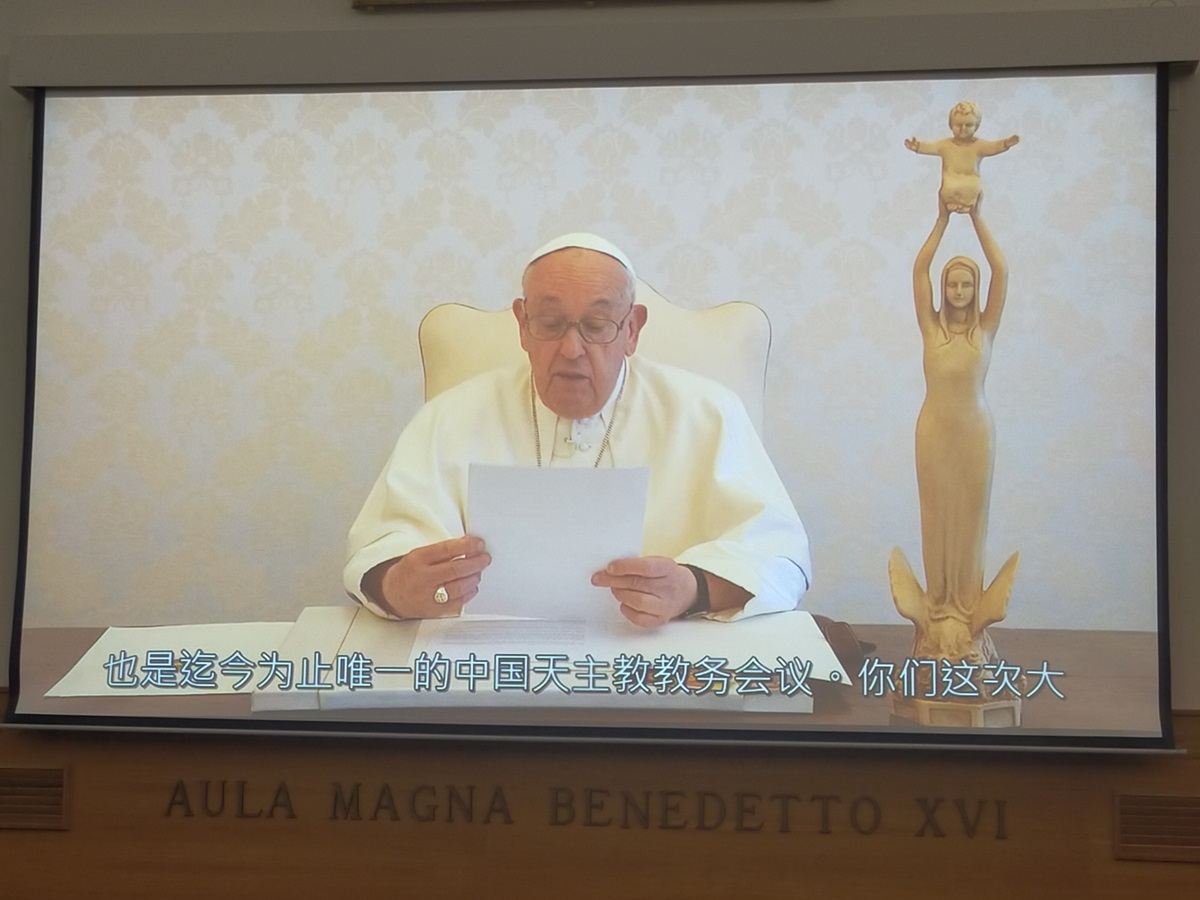Pope: ‘In China the faith guarded by the people of God shows the way’.
In a video message to a conference being held in Rome at the Urbaniana University with participants from the People's Republic of China the history and present of the Church in China on the centenary of the Shanghai Council. ‘Those who follow Jesus love peace, and stand together with all those who work for peace’.
Vatican City (AsiaNews) - The Church's journey in China has passed through times ‘of patience and trial’, but it has been the ‘faith of God's people that has shown the way’. And it is the way also for the witness of Catholics who ‘in communion with the Bishop of Rome, walk in the present time’ in China. Aware that ‘those who follow Jesus love peace, and are together with all those who work for peace, at a time when we see inhuman forces at work that seem to want to hasten the end of the world’.
Pope Francis said this in a video message released today on the occasion of the conference promoted by the Pontifical Urbaniana University and Fides Agency on the centenary of the Concilium Sinense, the first and so far only Council of the Chinese Catholic Church, which took place in Shanghai between May and June 1924.
The day that brought together scholars and ecclesiastics, including some from mainland China, to reflect on the history of this event but also on its implications for the Church in China today. Significant in this sense was the presence in Rome at the appointment of the bishop of Shanghai, Msgr. Joseph Shen Bin, who heads the Council of Chinese Bishops, an ‘official’ body recognised by the Beijing government (but not as such by the Holy See).
In the video message, Pope Francis spoke with a reproduction of Our Lady of Sheshan, venerated in China, at his side. He explained that the centenary of the Shanghai Council ‘represents for many reasons a precious occasion’, the memory of which ‘can also suggest today to the whole Church new roads and open paths to be taken with boldness to proclaim and bear witness to the Gospel in the present’.
‘The Fathers gathered in the Concilium Sinense,’ the Pope recalled, ‘were almost all from distant countries, and before the Council many among them were not yet ready to consider entrusting the leadership of dioceses to priests and bishops born in China. Then, gathered in the Council, they all made a true synodal journey and signed the provisions that opened up new ways for the Church, including Catholic China, to increasingly have a Chinese face. They recognised that this was the step to take, because Christ's proclamation of salvation can only reach every human community and every single person if it speaks in their mother tongue’. In this ‘they followed in the footsteps of great missionaries, such as Fr Matteo Ricci-Lì Mǎdòu; they set out in the furrow opened by the Apostle Paul, when he preached that it is necessary to become all things to all people in order to proclaim and bear witness to the risen Christ’.
Citing the fundamental work of Archbishop Celso Costantini - the first Apostolic Delegate in China, who was the great organiser and guide of this historic event - Pope Francis stressed that at the Council of Shanghai ‘it was not a question of “changing strategy”, but of following the paths most in keeping with the nature of the Church and its mission. Trusting only in the grace of Christ Himself, and in His attractiveness. The participants in the first Concilium Sinense looked to the future. And their future is our present’.
‘The Church's journey through history has passed and passes through unforeseen paths, even through times of patience and trial,’ the pontiff further observed. ‘The Lord, in China, has kept the faith of God's people along the way. And the faith of God's people has been the compass that has shown the way throughout this time, before and after the Shanghai Council, until today’.
In the context in which they live, in fact, Chinese Christians ‘bear witness to their faith also with works of mercy and charity, and in their witness they make a real contribution to the harmony of social coexistence, to the building of the common home’.
‘Those who follow Jesus love peace,’ Pope Francis went on to say, ‘and find themselves together with all those who work for peace, at a time when we see inhuman forces at work that seem to want to hasten the end of the world’.
Finally, the Pontiff recalled how these days ‘many of our Chinese brothers and sisters go on pilgrimage to the Shrine of Sheshan, to entrust their prayers and their hopes to the intercession of the Mother of Jesus. In a few days, on 24 May, the feast of Mary Help of Christians, the Church around the world will pray with the brothers and sisters of the Church in China, as Pope Benedict XVI had requested in his Letter to Chinese Catholics’.
‘I too ideally climb the hill of Sheshan,’ Pope Francis concluded, ‘and all together let us entrust to Our Lady, Help of Christians, our brothers and sisters in the faith who are in China, all the Chinese people, and all our poor world, asking for her intercession, so that peace may always win everywhere.







.png)










